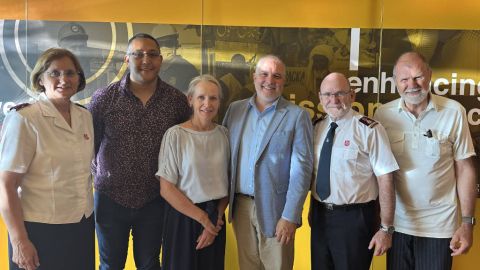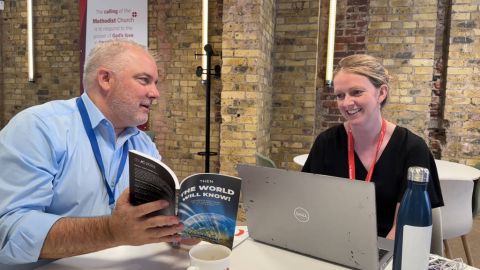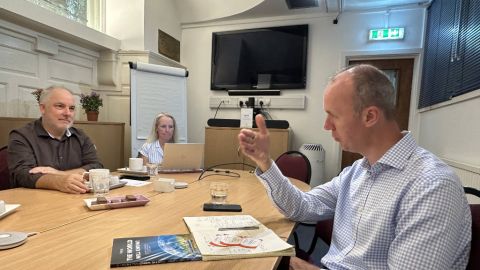 At the Salvation Army headquarters, from left to right: Jane Paone, Mark Williamson, Sylviane and Olivier Fleury, Lyndon Buckingham, and Martin Hoegger
At the Salvation Army headquarters, from left to right: Jane Paone, Mark Williamson, Sylviane and Olivier Fleury, Lyndon Buckingham, and Martin Hoegger
As part of the JC2033 initiative, we continued our visit to London. After visiting the leaders of Churches Together, we met with three key players in British Christian life: the Salvation Army, the Methodist Church, and the London Institute for Contemporary Christianity. These exchanges revealed a strong common thread: the call to combine social action and evangelism.
All three, each in their own way, remind us that Christian witness cannot be limited to one or the other. The proclamation of the Gospel takes shape in concrete acts of service, and social action is rooted in the good news of Christ's Resurrection.
Salvation Army Headquarters
A stone's throw from St. Paul's Cathedral, we were warmly welcomed at the Salvation Army headquarters by General Lyndon Buckingham. “Tell me what's on your mind!” were his first words. After Olivier Fleury's presentation of JC2033, he responded spontaneously: “What do you want us to do?”
Our visit came at a symbolic moment. The next day, The Salvation Army was celebrating its 160th anniversary. Originally from New Zealand, General Buckingham served in international ministries, notably in Singapore, before taking up his global duties in August 2023 for a five-year term.
Olivier Fleury asked him, “What gift can The Salvation Army, locally and globally, offer to Christ for the anniversary in 2033?” The General acknowledged that our visit had raised his awareness. He recalled that Jesus was more on the roads than in the synagogues, and that “the worst thing that could happen would be for Christians to remain among themselves.” With a presence in 140 countries, he emphasized that The Salvation Army must consider its role in this jubilee.
Introduced to the general by Jane Paone (whom we met through the World Council of Churches and the Lausanne Movement), we heard his reminder: The Salvation Army, founded by William and Catherine Booth, wanted to reach people with the Gospel, through social action and the Word. “The road to 2033 can help rekindle that fire,” she said, at a time when evangelism is somewhat in decline.
The General confirmed the importance of a “holistic” or integral ministry, both social and spiritual, ensuring that everything is connected to the Gospel. He encouraged us to carefully train the ambassadors of JC2033 so that they can carry out their mission in a clear and supported manner.
Methodist Church
We then met Holly Adams, head of the Methodist Church's evangelism program. She seeks to develop small evangelistic communities, for example, around major Christian holidays, by organizing an annual event.
 Olivier Fleury withHolly Adams
Olivier Fleury withHolly Adams
She recalled that in Methodism, social action and evangelism go hand in hand, but that this balance has yet to be restored today. For many Methodists, witness is reduced to social action, without any evangelistic dimension. “Sometimes I feel like a voice in the wilderness,” she confides.
For Holly Adams, evangelism should be motivated not by the decline of the Church, but by the love of Jesus. Regarding 2033, she insists that this year should not be a celebration of Christianity as an institution, but rather a proclamation of the central message: “Christ is truly Risen!” Every Christian should be encouraged to witness to at least one person.
London Institute for Contemporary Christianity
 With Paul Woolley
With Paul Woolley
Founded in 1984 by Anglican pastor John Stott, then chaplain to Queen Elizabeth, the London Institute for Contemporary Christianity is a center for reflection and training that produces rich resources for Christians.
We met with Paul Woolley, who is responsible for integrating theology into public life. He had recently participated in a national prayer breakfast. When he heard the presentation of JC2033, he immediately agreed: “The Resurrection of Jesus is the promise of our Resurrection, of the renewal of all things and of our personal lives.”
He sees JC2033 as an ideal opportunity to highlight the significance of the Resurrection: not only its historical basis, but also the hope and promises it contains.
Referring to the writer C.S. Lewis, he recalled this striking image: the Risen Jesus appearing to his disciples was not just a spirit, but “more real than the closed door he walked through.”
All of the meetings held in London showed how much the JC2033 initiative can awaken the Church to a witness that is both integral and missionary. There is a threefold urgency: not to remain among Christians, but to reach out to the crowds where they are; to rediscover the balance between social service and the explicit proclamation of the Gospel; and to remember that the Resurrection is not only a historical fact but a living hope that transforms society. Thus, the horizon of 2033 appears as a prophetic opportunity: to restore the Church's witness to the world. And the urgency of remembering that the Resurrection is not only a historical fact, but a living hope that transforms society.
Thus, the horizon of 2033 appears as a prophetic opportunity: to rekindle fire and vision, combining love in action and proclamation of the Gospel, and to celebrate together the victory of the Risen Christ.
Martin Hoegger



